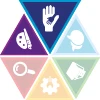Mediator

Mediators should be capable of:
- Providing personal assistance, medical attention, emotional support, or other personal care to others such as coworkers, customers, or patients.
- Developing constructive and cooperative working relationships with others, and maintaining them over time.
- Performing for people or dealing directly with the public. This includes serving customers in restaurants and stores, and receiving clients or guests.
- Handling complaints, settling disputes, and resolving grievances and conflicts, or otherwise negotiating with others.
Technician

Technicians will often be asked these tasks:
- Providing documentation, detailed instructions, drawings, or specifications to tell others about how devices, parts, equipment, or structures are to be fabricated, constructed, assembled, modified, maintained, or used.
- Using computers and computer systems (including hardware and software) to program, write software, set up functions, enter data, or process information.
- Servicing, repairing, calibrating, regulating, fine-tuning, or testing machines, devices, and equipment that operate primarily on the basis of electrical or electronic (not mechanical) principles.
Other work activities related to Marriage and family therapists
- Developing and implementing individualized treatment plans addressing family relationship problems, destructive patterns of behavior, and other personal issues.
- Conferring with other counselors, doctors, and professionals for analyzing individual cases and for coordinating counseling services.
- Asking questions for helping clients in identifying their feelings and behaviors.
- Counseling clients on concerns, such as unsatisfactory relationships, divorce and separation, child rearing, home management, or financial difficulties.
- Encouraging individuals and family members for developing and using skills and strategies for confronting their problems in a constructive manner.
- Maintaining case files that include activities, progress notes, evaluations, and recommendations.
- Collecting information about clients, using techniques such as testing, interviewing, discussion, or observation.
- Conferring with clients for developing plans for posttreatment activities.







